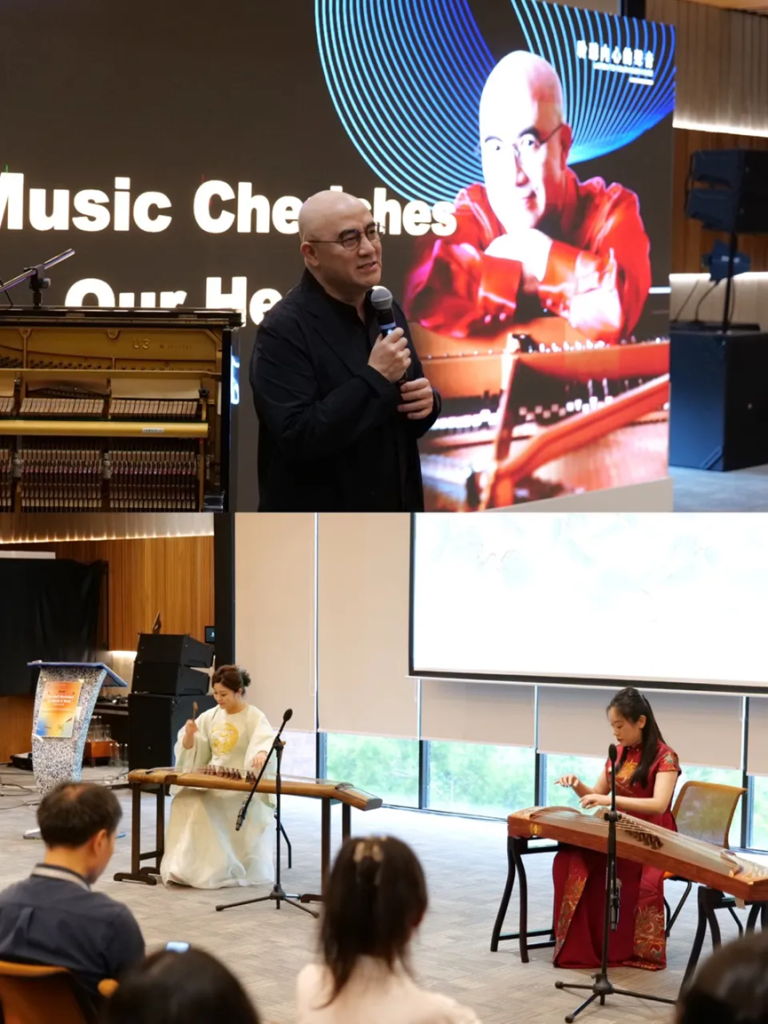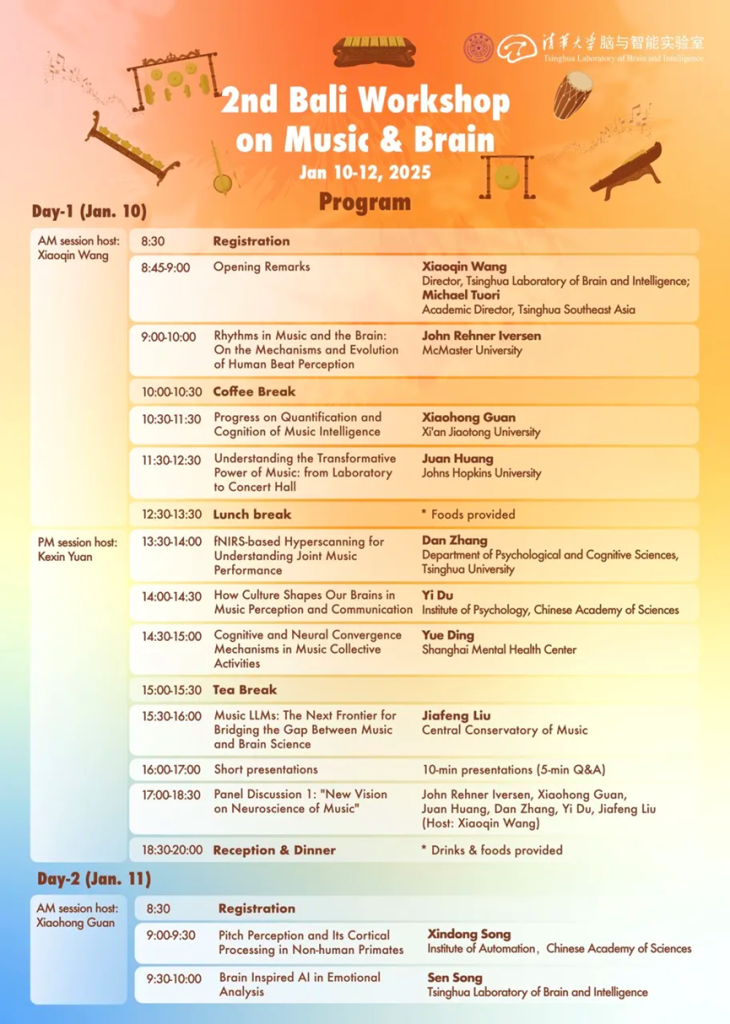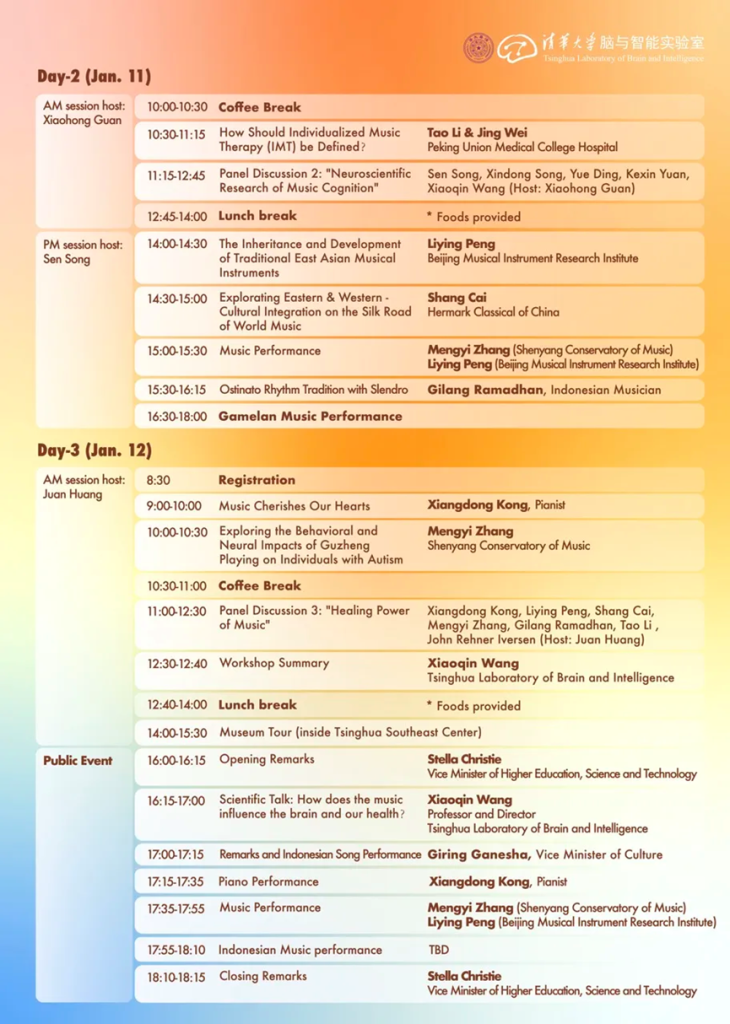The 2nd Bali Workshop on Music and Brain Successfully Held at Tsinghua University Southeast Asia Center
 Fig. 1: Group photo of participants
Fig. 1: Group photo of participants
From January 10–12, 2025, the Tsinghua Laboratory of Brain and Intelligence (THBI) successfully held the Second Bali Workshop on Music and Brain Science at the Tsinghua University Southeast Asia Center. The workshop brought together more than 80 participants, including cognitive scientists, neuroscientists, clinical psychologists, computer scientists, musicians, and music theorists from China, Canada, Switzerland, and Indonesia. Attendees included both senior researchers and young scholars in the field of music and brain science.
This year’s workshop emphasized the importance of interdisciplinary approaches in music and brain research. Participants engaged in deep discussions on the neural coding mechanisms of musical elements, the analysis of brain activity during music performance and perception, and the therapeutic potential of music. They explored music’s effects on emotion and cognition, as well as its applications in promoting human physical and mental health.
In his opening remarks, Professor Xiaoqin Wang, Director of THBI, outlined the purpose and distinguishing features of the workshop series: to focus on cutting-edge discoveries in music and brain research, to highlight interdisciplinary backgrounds and the participation of professional musicians, and—unlike typical international conferences—to provide ample time for dialogue and discussion. Continuing the tradition of the first Bali Symposium, each day featured themed discussion sessions that provided opportunities for in-depth exchange on key topics such as new perspectives in music neuroscience, neural mechanisms of music cognition, and the therapeutic efficacy of music.
 Fig. 2: Moments from the symposium
Fig. 2: Moments from the symposium
The first keynote was delivered by Professor John Rehner Iversen of McMaster University, Canada, titled “Music and Rhythm in the Brain: Mechanisms and Evolution of Human Beat Perception.” Drawing on well-known animal studies in rhythm research, he discussed behavioral and neural mechanisms of human beat perception and their possible evolutionary origins.
Academician Xiaohong Guan of Xi’an Jiaotong University gave a talk on “Quantification and Cognitive Progress of Music Intelligence,” presenting a power-law distribution model for pitch in both Chinese traditional and Western music, elaborating on the significance of computational models in music theory, and sharing his own explorations at the intersection of music and technology as a music enthusiast.
Senior Visiting Scholar of THBI and Johns Hopkins University researcher Ju-An Huang presented an analysis of international trends in music neuroscience research and introduced methodological innovations from Tsinghua’s music neuroscience team. She argued that moving from traditional laboratory settings to naturalistic studies in live performance contexts is essential for uncovering music’s neural mechanisms, and she emphasized that incorporating traditional Chinese music—a long-neglected subject in the field—is a historic mission for Chinese scholars.
Professor Dan Zhang from Tsinghua University’s Department of Psychology reported on “Understanding Cooperative Musical Performance Using fNIRS Hyperscanning,” offering detailed analysis of inter-brain correlation methods.
Researcher Yi Du from the Institute of Psychology, Chinese Academy of Sciences, presented on “How Culture Shapes Our Brains in Music Perception and Communication,” summarizing new findings on cultural influences in music perception and interaction.
Researcher Yue Ding from the Shanghai Mental Health Center reported on “Cognitive and Neural Convergence Mechanisms in Collective Musical Activities.”
Professor Jiafeng Liu from the Central Conservatory of Music introduced his vision in “Music Large Language Models: Linking Music and Brain Science at the Next Frontier,” proposing the innovative use of LLMs to generate music materials suitable for neuroscience research.
Professor Sen Song from THBI presented “Brain-Inspired Artificial Intelligence in Affective Analysis,” stressing AI’s potential as a big-data tool in music neuroscience.
Researcher Xindong Song from the Institute of Automation, Chinese Academy of Sciences, reported on “Neural Mechanisms of Pitch Perception in Non-Human Primates,” highlighting new findings on pitch encoding, hierarchical processing, and its evolutionary significance.
Professor Tao Li from Peking Union Medical College Hospital presented “How to Define Personalized Music Therapy?”proposing clinical concepts and technical pathways for music-based therapy.
Professor Mengyi Zhang, guzheng performer at Shenyang Conservatory of Music, presented findings on “Exploring the Effects of Guzheng Playing and Singing on the Behavior and Neural Connectivity of Children with Autism,” and shared compelling video demonstrations of training processes and behavioral outcomes.
Other workshop participants included Professor Xiaobing Li (Chair, Department of Music AI and Music Information Technology, Central Conservatory of Music), Professor Zongquan Huang (Executive Deputy Editor-in-Chief, Journal of the Central Conservatory of Music), Professor Kexin Yuan (School of Biomedical Engineering, Tsinghua University), and Professor Dangxiao Wang (Beihang University).
 Fig. 3: Balinese gamelan performance and interactive session
Fig. 3: Balinese gamelan performance and interactive session
A highlight of the workshop was the interaction between musicians and scientists from China and abroad. Professor Liying Peng, musician and instrument maker from the Beijing Institute of Musical Instruments, introduced “The Inheritance and Development of East Asian Traditional Instruments,” presenting ancient Chinese court music and her work in reviving lost instruments such as the zhu and Yazheng.
Renowned music producer and manager Shang Cai shared “Exploring East and West: Cultural Integration on the Silk Road of World Music,” featuring an Armenian band’s rendition of the classic Chinese piece “Moonlit Night on the Spring River,” which deeply impressed the audience.
Traditional zither players Professor Mengyi Zhang (Shenyang Conservatory of Music) and Professor Liying Peng collaborated in a joint performance, bringing traditional Chinese music vividly to life.
Indonesian percussionist Gilang Ramadhan gave a presentation titled “Traditional Fixed Rhythms in the Slendro Scale,”and introduced the Pelog mode, another distinctive tuning system in Indonesian music, giving participants a clear sense of Indonesia’s rich musical heritage.
The workshop also featured a live performance by a renowned Balinese gamelan ensemble, who enthusiastically engaged with the audience.
Chinese piano master Xiangdong Kong gave a special lecture, “Music Nurtures Our Souls,” sharing his reflections on life and music and presenting compelling cases of music’s healing power.
 Fig. 4: Musicians’ presentations (Xiangdong Kong, Mengyi Zhang, Liying Peng)
Fig. 4: Musicians’ presentations (Xiangdong Kong, Mengyi Zhang, Liying Peng)
Another highlight of this year’s workshop was the public science-and-culture event “Music and the Brain,” jointly organized by Tsinghua Laboratory of Brain and Intelligence with the Indonesian Ministry of Higher Education, Science, and Technology and the Ministry of Culture.
Professor Xiaoqin Wang delivered a lecture titled “How Music Affects the Brain and Health,” explaining neural mechanisms of music processing and the applications of music therapy in improving human health.
Dr. Stella Christie, Vice Minister of Higher Education, Science, and Technology, and Mr. Giring Ganesha, Vice Minister of Culture, co-hosted the event, demonstrating their openness and leadership in promoting science, education, and culture. Mr. Ganesha, together with Chinese musicians, personally participated in a real-time brain activity recording experiment using portable fNIRS equipment—an engaging demonstration for the Indonesian public on how music influences brain function. The demonstration resonated strongly with the audience.
The Second Bali Symposium not only advanced research innovation in music neuroscience but also highlighted music’s dual value as both an art form and a tool for scientific exploration. The event built a bridge for deeper cooperation between China and Indonesia in science, culture, art, and education.
 Fig. 5: Public “Music and the Brain” event
Fig. 5: Public “Music and the Brain” event
(top to bottom / left to right: Xiaoqin Wang, Xiaohong Guan, Liying Peng, Mengyi Zhang, Giring Ganesha, Xiangdong Kong, Stella Christie)
This workshop was strongly supported by the Tsinghua University Research Institute, the Tsinghua University Southeast Asia Center, the UID Foundation, Boricon Technology Co., Ltd., and Danyang Huichuang Medical Equipment Co., Ltd. Tsinghua Laboratory of Brain and Intelligence hopes to establish the Bali Workshop on Music and Brain as a lasting platform for international exchange in the field of music neuroscience.


